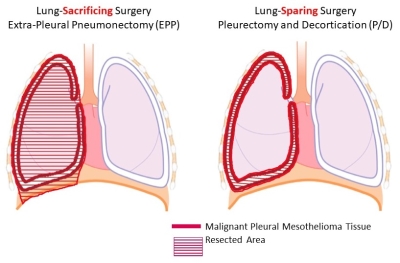
MD Anderson Cancer Center conducted a
retrospective study comparing surgical outcomes and long-term survival of mesothelioma patients
who underwent either the extra-pleural pneumonectomy (EPP) or the pleurectomy/decortication
(P/D) over the last two decades.
Although the study concluded that both the EPP and P/D had comparable long
term oncological outcomes, it found that the P/D was better tolerated
and had much lower perioperative mortality rates. The EPP was formally
the surgery of choice until patients started choosing the P/D more in
recent years.
The EPP is considered the more aggressive surgery since it involves the
entire removal of the diseased lung. Whereas the P/D, the procedure pioneered
by renowned UCLA cardiothoracic surgeon,
Dr. Robert Cameron is the more conservative option targeting the removal of just the affected
pleural lining and any visible tumors elsewhere in the thoracic cavity
while leaving the lungs intact. Dr. Cameron is recognized as the innovator
and earliest proponent of the lung-sparing P/D which he has perfected over the
past 20 years.
These two surgical options have long been the subject of ongoing debate
in choosing the optimal treatment for mesothelioma patients. The consensus
has shown that there is no significant benefit in terms of survival by
choosing the riskier EPP when the safer P/D is better tolerated. Ultimately,
whichever surgical option is chosen, the best results are achieved when
surgery is part of a multi-modal treatment plan, which may also include
radiation, immunotherapy and/or chemotherapy.